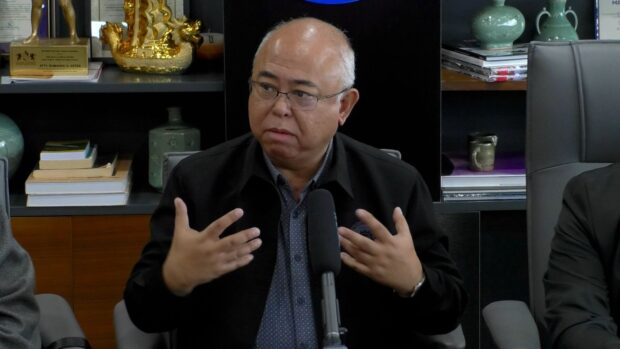
Land Transportation Office chief Vigor Mendoza ll speaks to members of the media during a press conference at the New MMDA Building in Pasig City on Thursday, February 15, 2024. Arnel Tacson/INQUIRER.net
The head of the Land Transportation Office (LTO), Transportation Assistant Secretary Vigor Mendoza II, has denounced the groups behind the paid advertisement in the Inquirer calling for his ouster due to supposed corruption and the agency’s illegal collection of computer fees.
The Feb. 6 ad was “obviously aimed at sowing hate and mistrust [in] the leadership of the LTO through false and misleading claims,” Mendoza said in a letter to the Inquirer on Wednesday.
“The audacity to publish unfounded allegations and the willingness to shell out huge sums of money for the advertisement clearly reek of desperation and a nefarious motive,” he added.
Mendoza said the groups behind the ad, in an attempt to “paint a bad image of the LTO,” had made it appear that all LTO clients were still paying computer fees, adding that this “only reveals malicious and evil intent.”
The LTO chief said the phaseout agreement between the government and the outgoing information technology (IT) service provider Stradcom Corp., signed way back in 2016, allowed the payment of computer fees until the LTO has completely migrated to the new and fully functional digital transaction system called the Land Transportation Management System (LTMS)
Stradcom contract
“This provision on the payment of computer fees, which includes a handful of specific transactions that cannot be processed under the LTMS, cannot be disregarded because this is clearly stated in the phaseout agreement. Doing so would only put the Philippine government in a bad light in terms of honoring contract obligations,” Mendoza added.
In a separate letter to the Inquirer, Stradcom’s lawyers Dante Desierto and Romulo Bernard Alarkon said the paid ad “wrongly alleges” that the company continued to collect fees without a valid contract with the LTO.
“This is a blatant lie,” they said, adding that Stradcom “has a valid, binding, enforceable and subsisting contract with the Republic of the Philippines for the continued operation and maintenance of the LTO IT System.”
Mendoza said the LTMS, which he prioritized when he assumed office in July last year to ensure fast, glitch-free and comfortable transactions, already has a usage rate of 97 percent compared with 70 percent when he took over.
According to him, the remaining 3 percent was still being handled by Stradcom for some parts of the country, such as the Bangsamoro Autonomous Region in Muslim Mindanao, and other remote areas in Zamboanga Peninsula and Northern Luzon where the LTMS was not yet fully functional due to poor internet connectivity.
No cost to government
“[T]he reason behind the charging of computer fees is plain and simple: it is being done in areas where LTMS is not yet functional due to internet connectivity [problems], and for the convenience of LTO clients who would seriously be affected if we chose to revert to manual processing, rather than taking advantage of the existing old system,” he explained.
Stradcom’s lawyers said the company’s IT system was delivered pursuant to the build-operate-transfer (BOT) law, which means the government did not spend a single centavo for its installation, delivery and continued maintenance.
“In exchange, Stradcom is allowed under the BOT law to charge a fee in order to recover the costs it incurred to deliver and maintain the system much like a toll operator charges toll fees in order to recoup the investment poured into the construction of public roads,” they said.
The company had unpaid computer fees owed by the government from 2010 to 2016, but still continued to render IT services anyway, the lawyers added.
Mendoza also reiterated that Stradcom has turned over 100 percent of the “legacy data,” or the old data, in line with his office’s “aggressive drive to fully migrate to the new IT system.”
Stradcom’s lawyers said the company turned over its electronic database “10 times” to LTO.
Trial by publicity
“There are no delays in motor vehicle registration renewal since 97 percent of transactions under this process have already been completed. In addition, 100 percent of the driver’s license applications are now also being processed under the LTMS,” Mendoza said.
“There is no perfect system and while there were a few instances of delay, this only happens during LTMS downtimes,” he added.
The LTO chief has been at odds with groups behind the ad, led by the Federation of Land Transport Organizations of the Philippines (Feltop), which has two pending complaints for graft before of the Office of the Ombudsman against Mendoza that were filed in November last year, with one of the cases pertaining to the computer fee issue.
He said that complaining groups have not even approached him and lamented why they have been resorting to “trial by publicity,” adding, “I don’t know who they are and how to face them to explain. Maybe if I [can] explain to them the situation, they will come to their senses.”
Asked in a recent radio interview about the motives of the groups, he replied: “Maybe they want to put [in my position] someone else who will promote whatever business interest they have.”
The LTO chief said criticisms, complaints and cases were part of the “hazards” of occupying a government post like his.
“It is part of public service. There are some people who are unhappy with what I’m doing; we don’t expect everybody to be happy but what’s important is for me to do what I must do regardless of whoever is not happy. Definitely, it’s the public whom I serve,” he said.